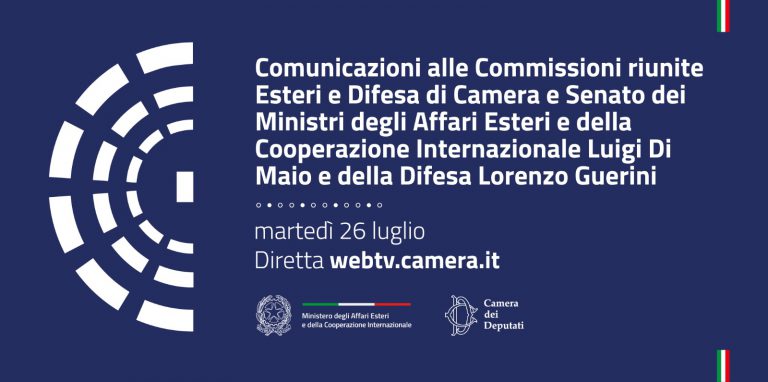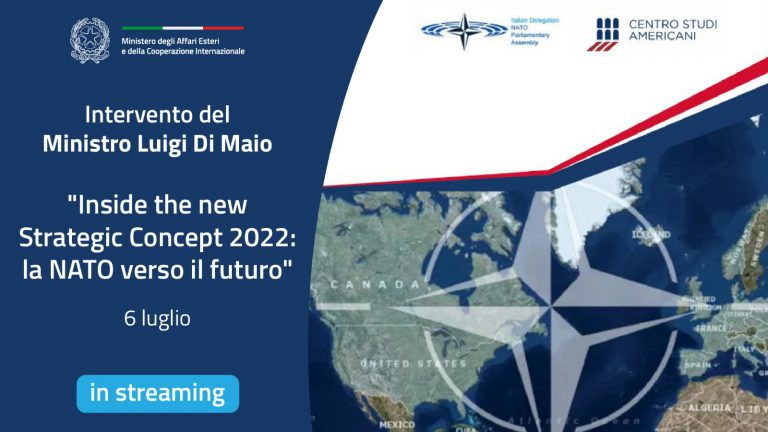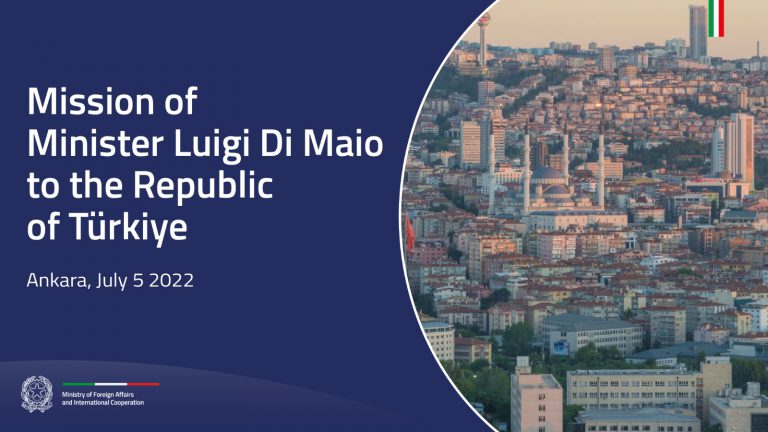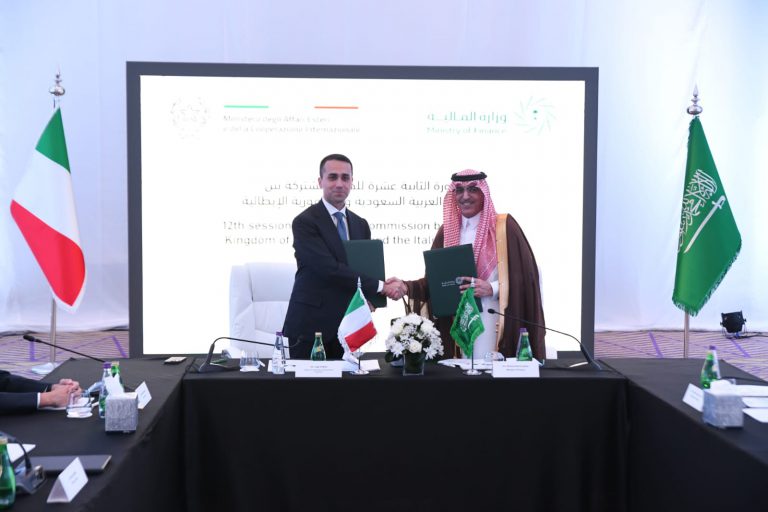He rides his 883 Harley Davidson 883 in jeans and sneakers; and plays with his two splendid 4-year-olds by his young partner, whose key feature is her infectious laugh. But this isn’t a wild biker or a 30-something yuppie. This is the man who, working silently with his European counterparts, is trying to save the Euro. The man who is helping our multinationals bring home important contracts. The man whose mediation saves the lives of many Italian nationals in trouble abroad.
Foreign Minister Giulio Terzi receives us in his 18th century home in Tresolzio, in Brembate di Sopra [near Bergamo]. We’re caught off guard to see this 66-year-old who looks 15 years younger, has a young, agreeable partner (the dynamic, and Neapolitan through-and-through, Antonella Cinque, and who is kidding around with his 4-year-old twins Giulio Jr. and Nina. “We got a 2-for-1 package: two at once so half the effort”, he days. Late fatherhood is an experience he shares with Minister Passera [Minister for Economic Development], thus demonstrating that in life (and we hope for Italy too) there’s always a second chance.
Giulio Terzi’s life has taken him around the world, in close contact with the worlds of politics (he’s thought to be close to Fini but defends the work of Berlusconi’s governments) and international power. He is, in fact, a true “Atlantic” man, as testified by his last two ambassadorial posts: in Israel and the United States. Similar considerations apply to his personal friendships with Clinton and Obama, who told Terzi “Thank you for your extraordinary work”.
We asked Minister Terzi how much Italy counts in the world and how he plans to help our companies in the difficult battlefield of the international markets. But above all we asked him whether the euro, and Italy, will emerge from the crisis.
Minister Terzi, Italy is in 69th place in the Transparency International’s Corruption Perceptions Index, 74th in the Heritage Foundation/Wall Street Journal’s Index of Economic Freedom, 72nd in Reporters Without Borders Worldwide’s Press Freedom Index (“partly free”), 48th in the World Economic Forum’s Global Competitiveness Report, 22nd in Human Development’s Education Index, 65nd in the Gender Equity Index, and 29th in the Economist Intelligence Unit’s Democracy Index.
“Italy counts, and counts very highly indeed. There’s a sort of inverse relationship between appearances and what I perceive as Foreign Minister, or what other members of the government perceive when they’re abroad. There’s a very high ‘index of demand’ for Italy, a confidence in our country that does not emerge in the various ‘league tables’. Indeed, it moves in the opposite direction to the indicators, which are often the fruit of ‘Sopranos’-style stereotypes.
However, these indices also contain a grain of truth. The one on corruption and organised crime, and the one on the lack of transparency, should give us food for thought. They should be prompting us to make a serious, urgent and daily commitment. The question of corruption is of fundamental importance. I believe many honest Italians suffer from a mentality which, if we’re talking taxes, we describe as ‘crafty’. But it’s the mentality of the dishonest, of people who commit crimes with impunity.
We’ve been subjected to a way of doing business, of bidding for public contracts or simply of managing money that belongs to each and every one of us that is, essentially, a sloppy, not to say arrogant, way of administering public money. These indices are a very clear warning of the negative consequences of certain vices if they persist: for the country’s external competitiveness, for those who make sacrifices each and every day to export and create jobs in Italy. These indicators give us an idea of just how urgent the anti-corruption decree that Minister Paola Severino has tabled in the Senate really is”.
Do you think the anti-corruption decree is strategic at the international level? For investors to back Italy again?
“Definitely, and for the country’s credibility. In meetings with government authorities and sovereign fund managers – from the Gulf and other countries – I’ve noticed that various actors have already started to make significant investments in our country and in our tourism, hotel and service infrastructure. But strong intervention is needed. We need to simplify and speed up our legal proceedings, especially for civil cases concerning company law and credit recovery. And government bodies need to pay their debts to private sector organisations. These measures are key if we are to create a more favourable environment for inward investment and for the internationalisation of ‘System Italy’, and therefore for growth”.
Staying on the subject of the indices, why does Italy have such a low press freedom ranking?
“Seeing Italy among the ‘partly free’ countries leaves me perplexed. I don’t know if they’re measuring us with the same yardstick as they used for the Anglo-Saxon countries. Major publishing and TV concentrations, which are deemed to be more virtuous, exist in other parts of the world too”.
In your view, when did Italy start to slip down the rankings? Was it the long Berlusconi experience that brought our international standing so low?
“The centre-right governments have, on the whole, been the victims of ungenerous press campaigns. To the extent, indeed, that some matters that clearly deserved appreciation – for example by the US administration on security issues or what Italy has done in Afghanistan, Libya and so many other parts of the world – simply were not reflected in American newspapers’ reports from Italy. They concentrated on gossip and judicial disputes”.
In what way does your foreign policy differ from your predecessor Frattini’s?
“I’d like to add a more marked focus on two aspects of the European and Atlantic dimension of our foreign policy: our enterprises abroad and our initiatives in the Broader Mediterranean. Let’s start with the second, the extraordinary dynamics that were created by the Arab Spring, which are inspiring the dramatic crisis in Syria. My aim was to inject into the day-to-day work of the Farnesina a strong commitment spanning a broad geo-political arc – an arc that sweeps from Morocco to Turkey and down to the Gulf, and which includes Israel. An arc where current events make Italy a leading actor, a bridge and a player that can act as a stimulus for European policies in the region”.
How would you assess the Iran-Israel crisis? Do you see an escalation?
“I’m very concerned about the possibility of Israeli military intervention. It’s possible. It’s hard to say how probable, but it’s a concrete possibility, because Israeli public opinion is fearful of the acceleration of the Iranian nuclear programme and of the fact that for 9 years now Teheran has systematically violated all of the UN and IAEA resolutions.
Iran has kept its uranium enrichment programmes hidden, it hasn’t provided any explanation of the evidence of warhead miniaturization. To this must be added its periodic observation that Israel is a plague on the face of the earth that must be eradicated. So I challenge anyone, anywhere in the world, not to feel threatened by these conditions, by a country with a loaded gun saying ‘I’ve got you in my sights’. If we fail to find a solution, the probability of an Israeli attack will increase. Moreover, the Iranian supreme court has reiterated its hard line. And Iran is working blatantly on nuclear weapons, a fact that only serves to constantly increase the sense of threat”.
Explain to us the economic part of your foreign policy.
“That’s the second strong plank of my foreign policy: helping our companies grasp growth opportunities in the world’s emerging regions: Brazil, Russia, South Africa and China. Asia as a whole is a giant market for Italy, a region that’s forging ahead in 5th gear. I was really impressed by what I saw in Indonesia, Vietnam, Burma and Thailand, where we’re travelling with a delegation of business people interested in entering or expanding in those markets. I’ve already accompanied 500 companies on such missions.
Africa too presents major opportunities: in Mozambique, ENI has found one of the world’s biggest natural gas fields. Similar considerations apply to South Africa. Turning to Brazil, our exports have grown by nearly 80% over two years. The figures speak for themselves. You could say that there are ‘two sides of the coin’ in our economy: an Italy that’s looking outwards to the rest of the world, with export growth rates of 10% in the first half of this year, and an impressive contracts and procurement portfolio. While the domestic economy is stagnant.
For the EU, however, our export figures point to a fall from the peak of 222 billion euros in 2007 to 209.9 billion in 2011. Why have we lost so much ground?
The euro region still accounts for 56% of our exports, even if we’ve fallen by 4.5% in the last 4 years. A fall, however, that’s just one point greater than that experienced by Germany and France. Of course, European trade is feeling some distress, given that Europe has a more integrated economy and is therefore feeling the effects of the crisis more keenly. But the transformation of the Mediterranean will favour our economy. Trade already amounts to 80 billion, with a good balance, even though these countries are raw material and energy suppliers. That means we have a very robust export capacity, with growth trending at 20% per year”.
Where does Italy stand with respect to China?
“Our relationship with the Chinese giant continues to be very strong. That applies to visas too: we issued one million in 2011, with significant growth rates. We’re aiming at a 30% increase in visas in 2013, with positive financial repercussions for the public coffers. Applicants have to pay for their visas, which bring in 80-90 million euros to the state. But the indirect benefits are much stronger, given that every additional 100,000 visas lead to a further 6-700 million for the economy”.
Let’s turn to the review of the Italian Trade Institute (ICE), an institute that had to be wound up. How will it be resurrected to support our enterprises abroad?
“The ICE has been completely overhauled. It had never managed to achieve the necessary functional and organisational co-penetration with our embassies. Now, however, the two networks are physically the same. The head of mission is also responsible for the work done by the ICE office, with a single line of command. The ICE’s budget will be coordinated with that of the Foreign Ministry”.
How can the task of revitalising our companies’ activities abroad be reconciled with the spending review? Our missions worldwide themselves cost 700 million a year. Are there perhaps too many of them?
“We’ve had to reduce spending and identify the most efficient courses of action for the Farnesina. Since my arrival in November 2011 I’ve created an independent commission that incudes a judge from the Court of Accounts, a parliamentary official, a former Under-Secretary for Foreign Affairs, a couple of representatives of political forces and members of the administration. We’ve made significant cuts on some posts, such as Italian teachers abroad.
We will also need to implement some mergers and rationalisation measures with respect to our cultural institutes. We have 89, but 15-20 of the institutes could be integrated better with the work of the embassies. This would produce major savings in operational costs, while still retaining the position of cultural attaché in the embassies. We have 0.22% of the state budget: I’d prefer, naturally, to have 5 times that, like the French, or 3 times, like the British, or 4, like the Germans. Our embassies also serve to promote business and having more limited resources than our competitors is a handicap”.
But some commentators speak of excessive waste in our embassies, consulates and cultural institutes. What’s your response to that?
“It’s false to speak of excessive waste in our embassies. There is no waste at the Ministry itself, I can assure you. The Farnesina has a budget of 1.7 billion, and about 5,000 employees, including those abroad. We’ve lost around 1,400 people in the last 4 years, through not replacing those retiring or leaving the service. The United Kingdom has 13,000 employees, France 9,500 and Germany 10,000. As a country, our resources have been stripped to the bone, in terms of both labour force and funding”.
Let’s discuss Europe, Minister. Will the euro survive, and will Italy be a part of it? How?
“We need to set ourselves goals to get out of this crisis using the Six Pack instruments [the six European governance regulations, ed’s. note], but also, and above all, using the instruments of the European Financial Stability Facility (EFSF), or bail-out fund. We also need to implement the decisions of the European Council of 28 June, which are central to the European Central Bank’s mandate and the European Stability Mechanism. For us, stability means the possibility of ECB interventions on the secondary markets to create a buffer against spread fluctuations, which are too high and, given Italy’s structural and cyclical conditions, ungrounded. They are fluctuations caused purely by speculative market movements”.
Is it possible that the ECB will follow the lead of Switzerland, which has set an interest rate between the franc and the euro? Is that what Draghi has in mind?
“That’s one of the ideas that’s been aired. Italy can be pro-active, a driving force to take significant steps forward. In any case, we need a qualitative step-change, based on a political vision. And the legitimisation of the President of the Commission though a mechanism for election by the European Parliament, which will be submitted in October”.
Many, from Berlusconi to Maroni to Grillo, are calling for a return to the lira. What would happen if that came to pass?
“Leaving the euro would mean coming up against major difficulties in financing our public debt. Then the hypothetical advantage of competitive devaluation would cause inflationary forces to flare up, which would be destabilising for the country’s economic equilibria and in social terms too. The euro is accused of being at the root of the crisis, but the globalised finance ‘bubbles’ have done far worse damage”.
With this level of public deb, will Italy make it?
“I’m sure we’ll make it. Many business people, and members of various political groupings, are telling us ‘continue with this course of action’. The country will rise dramatically up the international ‘league tables’”.
Are you considering a possible future in politics?
“I’ve always had a relationship with politics: it’s difficult for a diplomat, and even more so for an ambassador, not to develop a very intense relationship with the political world. Diplomacy and journalism are the two professions closest to and most intertwined with politics. So I will definitely go on taking an interest in the things that have enthused me thus far”.
Will the Monti Government continue after the elections?
“I hope our team consolidates and safeguards the goals achieved to date. As a citizen, I think the country needs to continue along this road, in view of Italy’s role in the world”.






